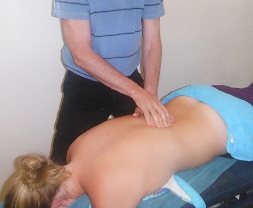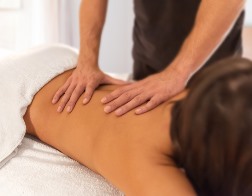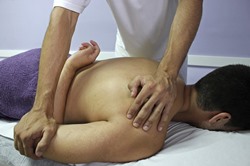What is a Massage Therapist?
 As previously discussed, massage therapy is an alternative form of healing that provides relief from pain and helps people function better. The massage therapist manually stimulates muscles, tissue and skin to diminish stress and relieve pain and tension in their clients. Swedish, or Classic Massage, is the type of massage that many people relate to when researching therapeutic massage, and the majority of Dartmouth MA massage therapy schools teach it as their primary type of massage. However, there are numerous other forms of massage that schools have the option to include as part of their course of instruction. Following are some of the more popular examples.
As previously discussed, massage therapy is an alternative form of healing that provides relief from pain and helps people function better. The massage therapist manually stimulates muscles, tissue and skin to diminish stress and relieve pain and tension in their clients. Swedish, or Classic Massage, is the type of massage that many people relate to when researching therapeutic massage, and the majority of Dartmouth MA massage therapy schools teach it as their primary type of massage. However, there are numerous other forms of massage that schools have the option to include as part of their course of instruction. Following are some of the more popular examples.
- Neuromuscular Therapy Massage
- Deep Tissue Massage
- Sports Massage
- Shiatsu Massage
- Thai Massage
- Hot Stone Massage
- Pregnancy Massage
Practitioners that work in massage therapy are properly referred to as massage therapists. On occasion one may hear them called a masseur or a masseuse, which is generally the name of a female or a male massage practitioner. However, these terms typically have a negative connotation among Dartmouth MA professionals and the public at large and are better avoided.
Massage Therapist Training Requirements
 The majority of Dartmouth MA massage therapy programs require that the enrollee has earned a high school diploma or a GED to qualify. Programs can range in length from several months for a Certificate or a Diploma to as long as two years for an Associate’s Degree. How long the programs are will also be State specific based on the training hours required for licensing. Another factor that may also have an effect on the length of the program is whether classes are offered during the day or at night. In addition, an Associate Degree in Massage Therapy often has general studies requirements and are often transferrable into a similar Bachelor’s Degree Program. After you have received your Degree, Diploma or Certificate, the training doesn’t stop there. The type and amount of continuing education you are required to complete will vary based on the State where you are licensed. Some states require both a certain number of hours of continuing education as well as specific education in subjects, such as ethics or HIPAA compliance.
The majority of Dartmouth MA massage therapy programs require that the enrollee has earned a high school diploma or a GED to qualify. Programs can range in length from several months for a Certificate or a Diploma to as long as two years for an Associate’s Degree. How long the programs are will also be State specific based on the training hours required for licensing. Another factor that may also have an effect on the length of the program is whether classes are offered during the day or at night. In addition, an Associate Degree in Massage Therapy often has general studies requirements and are often transferrable into a similar Bachelor’s Degree Program. After you have received your Degree, Diploma or Certificate, the training doesn’t stop there. The type and amount of continuing education you are required to complete will vary based on the State where you are licensed. Some states require both a certain number of hours of continuing education as well as specific education in subjects, such as ethics or HIPAA compliance.
Massage Therapist Licensing
 After your graduation from an accredited Dartmouth MA massage therapy program, you will then need to become licensed in the State where you will be practicing. The Massage & Bodywork Licensing Examination (MBLEx), is an exam conducted and controlled by the Federation of State Massage Therapy Boards (FSMTB) and is required by the majority of States as a portion of the licensing process. There are States that have their own or additional exams, so check with your State before enrolling in a massage therapy school. If you fail the MBLEx in your initial attempt, you can take it again after 30 days but will be charged another testing fee. Once licensed, you will be required to renew it in most states, which means paying a renewal fee and satisfying renewal requirements. As previously mentioned, completion of a specific number of continuing education hours are usually required as a prerequisite for renewal. And if you decide to move to a different State, you will need to get licensed in that new State as well. Each State regulates massage therapy differently, so it is not safe to assume that you will automatically qualify for licensing. Confirm with your new State prior to moving that you have satisfied the requirements to practice legally there.
After your graduation from an accredited Dartmouth MA massage therapy program, you will then need to become licensed in the State where you will be practicing. The Massage & Bodywork Licensing Examination (MBLEx), is an exam conducted and controlled by the Federation of State Massage Therapy Boards (FSMTB) and is required by the majority of States as a portion of the licensing process. There are States that have their own or additional exams, so check with your State before enrolling in a massage therapy school. If you fail the MBLEx in your initial attempt, you can take it again after 30 days but will be charged another testing fee. Once licensed, you will be required to renew it in most states, which means paying a renewal fee and satisfying renewal requirements. As previously mentioned, completion of a specific number of continuing education hours are usually required as a prerequisite for renewal. And if you decide to move to a different State, you will need to get licensed in that new State as well. Each State regulates massage therapy differently, so it is not safe to assume that you will automatically qualify for licensing. Confirm with your new State prior to moving that you have satisfied the requirements to practice legally there.
